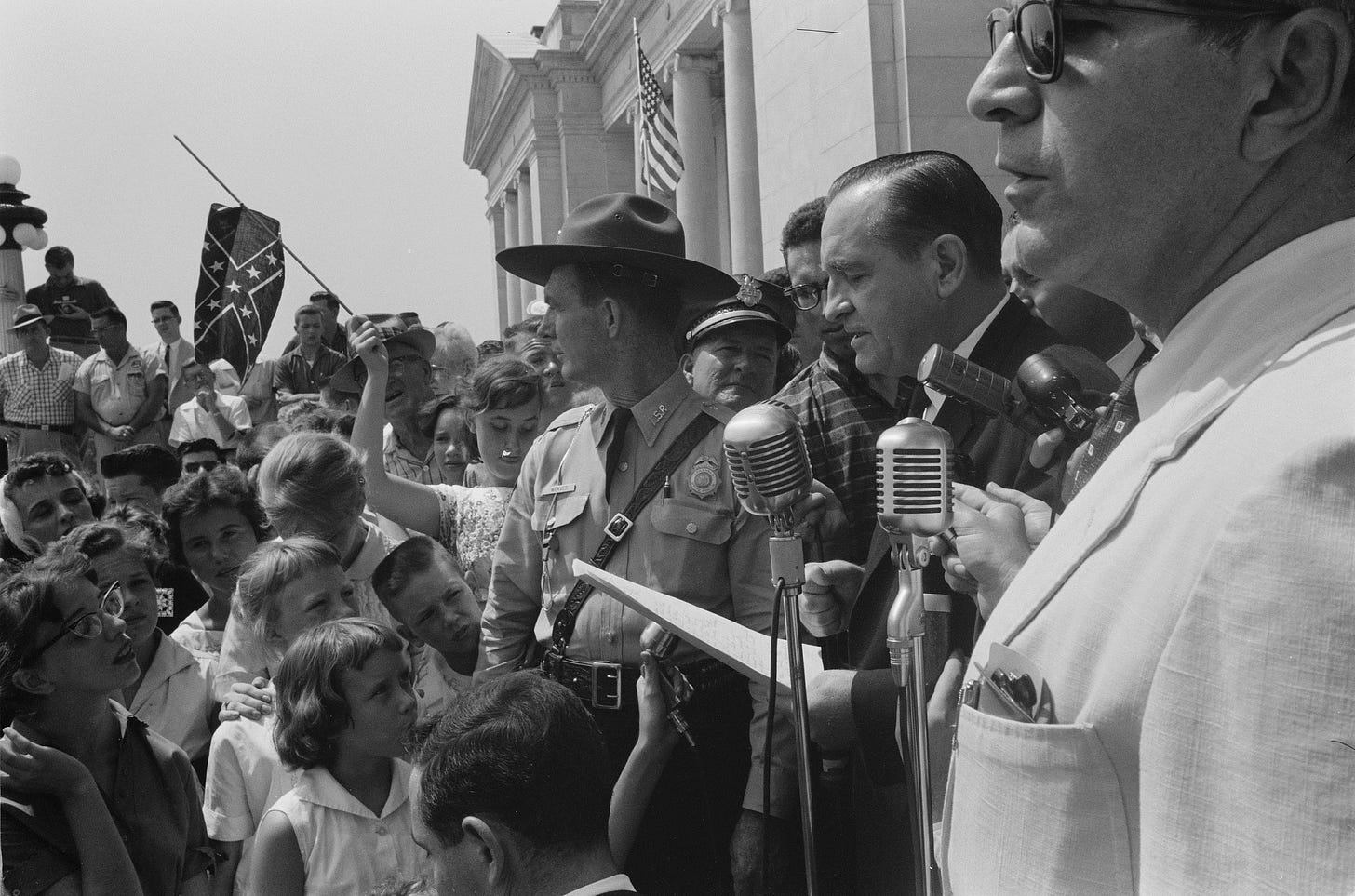
This Day in Legal History: Orval Faubus Resists Brown v. Board of Education
On September 4, 1957, Arkansas Governor Orval Faubus made a highly controversial decision to call in the Arkansas National Guard to prevent nine Black students, known as the "Little Rock Nine," from entering Central High School. This action directly defied a federal court order mandating the integration of public schools, following the landmark 1954 Supreme Court decision in Brown v. Board of Education, which declared racial segregation in schools unconstitutional. Faubus argued that the move was necessary to prevent violence, but critics saw it as a blatant attempt to resist desegregation.
The crisis quickly escalated into a national issue. President Dwight D. Eisenhower responded by deploying the 101st Airborne Division to Little Rock on September 24, 1957, and federalized the Arkansas National Guard to ensure that the students could safely attend school. This marked one of the most significant federal interventions in a state's civil rights matter during the 20th century. The standoff highlighted the ongoing resistance to civil rights in the South and the federal government’s increasing role in enforcing civil rights legislation. Central High School became a symbol of the struggle to dismantle Jim Crow segregation, and the courage of the Little Rock Nine became a defining moment in the broader civil rights movement.
After leaving the governorship, Orval Faubus made several unsuccessful attempts to reclaim his political position, running in the Democratic primaries in 1970, 1974, and 1986 but losing to prominent figures such as Dale Bumpers, David Pryor, and Bill Clinton. Despite these defeats, Faubus remained active in politics and made a surprising shift in the 1980s by supporting civil rights leader Jesse Jackson during the 1984 and 1988 Democratic presidential primaries. Faubus passed away from prostate cancer on December 14, 1994, and was laid to rest in Combs, Arkansas.
Former U.S. President Donald Trump announced in a court filing that he would plead not guilty to the charges in a revised indictment accusing him of trying to overturn the 2020 election. The indictment, brought by Special Counsel Jack Smith, reiterates the original four charges, including fraud and obstruction related to the election's certification. Trump chose to waive his court appearance, allowing his attorneys to enter the plea on his behalf. The indictment was revised after the U.S. Supreme Court ruled that Trump has broad immunity from prosecution over actions taken during his presidency. Trump's legal team and prosecutors are set to meet to determine next steps following the court's decision.
Trump to plead not guilty to charges in revised US indictment | Reuters
A U.S. judge ruled that former President Donald Trump cannot move his New York hush-money case to federal court, denying his bid to delay sentencing beyond the November 2024 election. U.S. District Judge Alvin Hellerstein stated that Trump's actions, involving hush-money payments to Stormy Daniels, were private and unrelated to his presidential duties, falling outside the bounds of federal jurisdiction. Trump argued the case should be dismissed based on the Supreme Court's ruling granting broad immunity to presidents for official conduct, but Hellerstein found the payments were not part of his official role. Trump has filed an appeal, continuing his efforts to transfer the case, while his sentencing remains scheduled for September 18. The case stems from Trump's conviction for falsifying business records related to a $130,000 payment to Daniels to suppress claims of a past affair during the 2016 campaign.
Trump Loses Bid to Move NY Hush-Money Case to Federal Court (3)
Starlink, Elon Musk's satellite broadband company, has complied with a Brazilian Supreme Court order to block access to the social media platform X in Brazil, after initially resisting the directive. The court's order, issued by Judge Alexandre de Moraes, included freezing Starlink's accounts to secure potential fines owed by X, which is also owned by Musk. Despite calling the freeze illegal, Starlink announced it would follow the court order. Brazil's telecom regulator, Anatel, confirmed that Starlink had begun restricting access to X. The platform was ordered blocked for lacking a legal representative in Brazil, a decision upheld by the Supreme Court. Starlink has since initiated legal proceedings challenging the order, arguing it violates Brazil's constitution. The conflict stems from a prior Moraes ruling that targeted X for spreading misinformation and hate speech, which Musk denounced as censorship. Some users in Brazil continue to access X through alternative methods like VPNs.
Starlink backtracks, complies with order blocking X in Brazil, says regulator | Reuters
A group of Republican-led states filed a lawsuit on September 3, 2024, seeking to block the Biden administration's new student loan relief plan. The lawsuit, filed in the Southern District of Georgia, claims the U.S. Education Department is overstepping its authority by pushing forward with a revised debt forgiveness plan after previous versions were halted by courts. This follows the Supreme Court's August 28 refusal to reinstate Biden’s earlier loan forgiveness initiative. The latest plan, which targets borrowers with increasing loan balances or those in repayment for over 20 years, is being challenged for allegedly circumventing prior court injunctions. The states, including Missouri and Georgia, argue the plan is unlawfully advancing and seek an immediate restraining order. Biden has continued efforts to reduce student debt after his initial forgiveness plan, which aimed to cancel up to $20,000 in loans for millions, was struck down by the Supreme Court in 2023.












